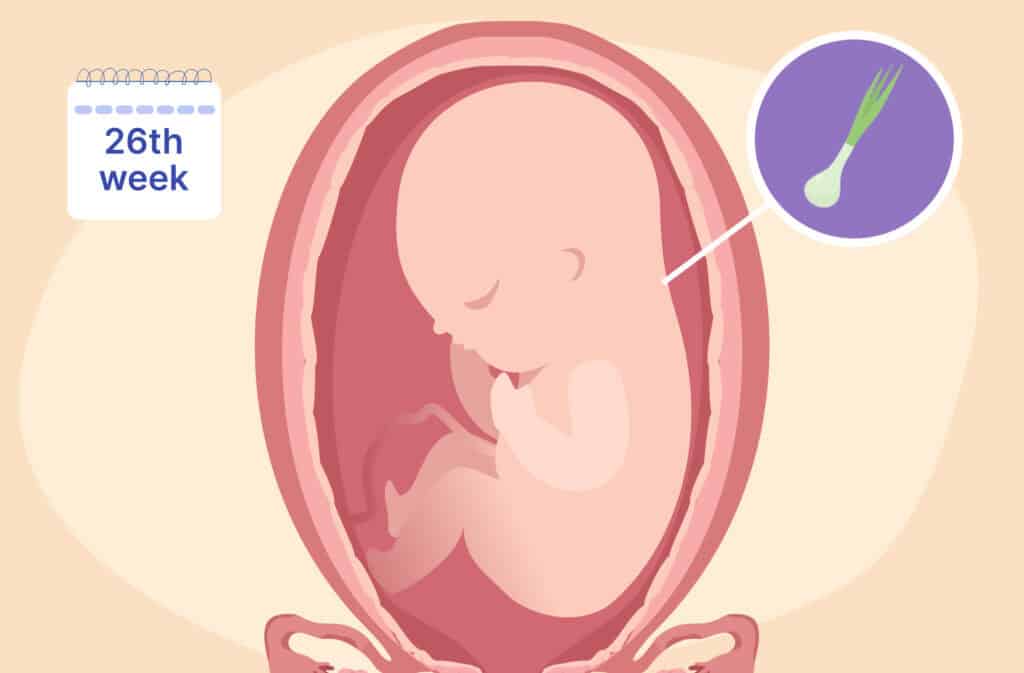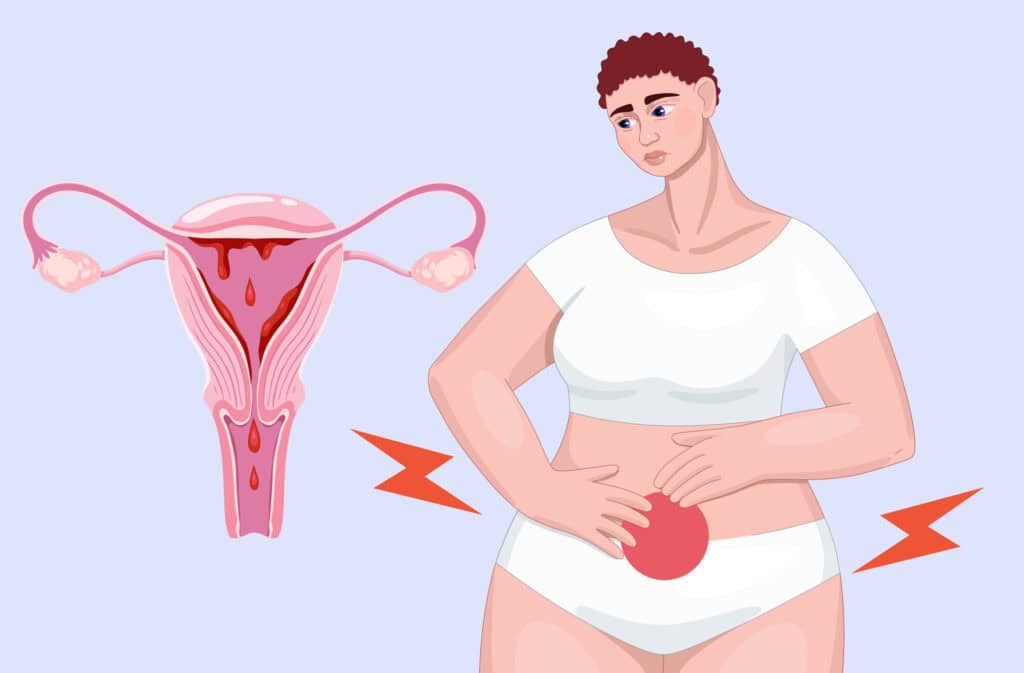Femia > Health Library > Pregnancy > Pregnancy week by week > Navigating week 26: Baby’s Growth, symptoms, and expert tips
Navigating week 26: Baby’s Growth, symptoms, and expert tips

- Updated Feb 20, 2025
- Published
CRAFTED BY HUMAN
Crafted by human At Femia, we provide accurate and up-to-date information at every stage of your journey, from trying to conceive, pregnancy and postnatal support. All content is created by a real person based on in-depth research and own professional experience. Femia ensures that you will receive expert advice, strict accuracy and a personalized approach from our authors/medical experts. Learn more about our editorial policy.
FACT CHECKED
Fact checked At Femia Health, we maintain the highest standards of editorial excellence in delivering content focused on helping you conceive, guiding you through pregnancy, and supporting you postpartum. Explore our content review principles to learn how we ensure the accuracy and quality of our health and lifestyle tips for every stage of your journey.

Created with Hector Chapa, MD, FACOG, Clinical associate professor, Obstetrics and Gynecology Texas A&M University, College of Medicine in Bryan-College Station, USA
At 26 weeks pregnant, your baby is growing stronger and practicing essential movements. Weighing nearly 2 pounds, your baby’s brain and lungs are starting to mature, preparing for life outside the womb. You may notice a larger bump, increased symptoms, and the need for self-care as you prepare for the final trimester.
Welcome to week 26 of your pregnancy! At this stage, your baby is growing rapidly, developing vital organs, and practicing movements like kicking and stretching. For moms-to-be, symptoms like back pain, swelling, and Braxton Hicks contractions may become more noticeable. Let’s explore what’s happening with your baby and body this week and provide tips to navigate the journey smoothly.
Track your symptoms with Femia and get tailored
health advice right on your phone
Pregnancy symptoms at 26 weeks
Here are common symptoms to expect during week 26 of pregnancy:
Lower-back pain
As your uterus grows and hormones loosen your joints and ligaments, lower-back pain becomes common. Approximately 60% of pregnant women experience this discomfort, which can interfere with sleep and daily tasks. Staying active with low-impact exercises like walking or swimming, along with stretching and strength training, can help alleviate pain. Prenatal massage, meditation, and yoga are also beneficial. Be mindful of your posture and make adjustments to sitting, standing, or sleeping positions that cause discomfort.
Braxton Hicks contractions
Braxton Hicks contractions, or “practice contractions,” occur irregularly before labor. They are often described as tightness in the abdomen or mild menstrual cramps. These contractions usually stop with rest, hydration, or a change in position. While they’re not typically painful, they can become more intense toward the end of pregnancy. If the contractions become regular or painful, or if you suspect early labor, contact your healthcare provider immediately.
Headaches
Hormonal changes, dehydration, and fatigue are common causes of headaches during pregnancy. Staying hydrated, eating regularly, and getting enough rest can help reduce headache frequency. If the pain persists, acetaminophen is usually safe to take for relief, but consult your provider first. However, severe headaches can be a sign of preeclampsia, a potentially dangerous condition that requires immediate medical attention.
Hemorrhoids
Hemorrhoids are swollen blood vessels around the rectum, often caused by the increased pressure from your growing uterus or constipation. They can lead to discomfort, itching, or bleeding, especially during bowel movements. To prevent hemorrhoids, stay hydrated, eat a high-fiber diet, and avoid straining during bowel movements. If hemorrhoids become painful, speak with your healthcare provider for treatment options, such as topical creams or suppositories that are safe during pregnancy.
Constipation
Hormonal changes slow digestion during pregnancy, often leading to constipation. As your uterus expands, it can also press on your intestines, making bowel movements harder. To alleviate constipation, drink plenty of water, eat a fiber-rich diet, and engage in regular exercise. If necessary, a stool softener or magnesium supplement can provide relief, but always consult your doctor before taking any new medications.
Stretch marks
As your baby grows, your skin stretches to accommodate the change, often resulting in stretch marks on your belly, breasts, or thighs. These marks are common and may be influenced by genetics. While there’s no foolproof way to prevent stretch marks, avoiding rapid weight gain and maintaining a healthy, steady weight gain during pregnancy can help minimize their appearance. Most stretch marks fade over time, though they may not disappear completely.
👉Find out more: 25 Weeks pregnant: How your baby’s growing and what you should know
26 Weeks pregnant: Symptoms not to ignore
- Severe swelling: Sudden or extreme swelling, especially in the face or hands, may indicate preeclampsia.
- Painful contractions: Regular, painful contractions could be a sign of preterm labor.
- Reduced baby movements: If you notice fewer baby movements, contact your healthcare provider immediately.
Your body at 26 weeks pregnant
At 26 weeks, your uterus is expanding rapidly as your baby grows. You might notice that your belly has become more pronounced, and your movements might feel less fluid, with more noticeable pressure on your lower back and pelvis. This growth puts additional strain on your muscles, which can result in discomfort. Some women also start experiencing leg cramps or more frequent trips to the bathroom as your baby takes up more space in your abdomen.
Common experiences during this stage include feeling more tired due to the extra weight you’re carrying. Your baby’s increased activity might make it difficult to get comfortable, and you may notice a more pronounced heart rate as your body works harder to supply oxygen to your growing baby. It’s important to stay hydrated and get enough rest to alleviate some of these symptoms. Keep in mind that while your body is going through significant changes, it’s crucial to listen to your body’s needs and make adjustments as necessary to keep yourself comfortable.
26-week pregnant belly
Your belly at 26 weeks is likely larger and rounder, and you may feel increased pressure on your lower abdomen. Maternity clothes are a must at this stage to keep you comfortable as your bump continues to grow.
Baby development at 26 weeks of pregnancy
- Your baby’s eyes open. At 26 weeks, your baby’s eyes are open, and although they can’t see much yet, their optic nerves are continuing to develop. Light can penetrate your abdomen, and your baby may respond to brighter light by turning toward it.
- Your baby’s lungs are maturing. Your baby’s lungs are working on their final stages of development. The alveoli, or tiny air sacs, are forming, and your baby is practicing breathing movements by inhaling amniotic fluid. However, the lungs are not fully developed yet.
- Responding to sounds. Your baby is now capable of hearing sounds. Although they are more responsive to lower-frequency noises, they can hear your voice and sounds from the outside world. Your baby may even move in response to loud or familiar noises, like your voice. This is an important milestone for sensory development.
26 weeks baby size
The 26-week fetus size is approximately 14 inches long and weighs about 1.7-2 pounds, comparable to the size of a green onion. This week is marked by steady growth and strength building.
26-week ultrasound
A 26-week ultrasound may provide a detailed look at your baby’s development, including their heart, lungs, and facial features. If you haven’t had a recent scan, this might be a follow-up to check your baby’s size, position, and overall health.
26-week preemie
Babies born at 26 weeks, though premature, have a survival rate from 40.6% to 64.2% with proper medical care. According to the American College of Obstetricians and Gynecologists (ACOG), a periviable birth is defined as occurring between 20 0/7 and 25 6/7 weeks of gestation. A baby born at this gestational age still faces significant risks of complications and prolonged hospitalizations.
Each additional week of pregnancy during this critical period provides a survival benefit and helps reduce the length of a preemie’s hospitalization.
If you are expected to deliver between 24 and 34 weeks of pregnancy, it is standard practice to administer a medication called antenatal corticosteroids while you are still pregnant. This medication helps prepare your baby’s lungs for life outside the womb and reduces the risk of other preemie complications. It is typically only given when delivery is anticipated within this gestational range
👉Find out more:
27 Weeks pregnant: Baby’s growth, symptoms, and tips for the third trimester
28 Weeks pregnant: Entering the third trimester with key insights
Tests to expect at 26 weeks pregnant
At 26 weeks pregnant, your healthcare provider will focus on monitoring your health and your baby’s growth with the following tests:
- Glucose tolerance test (GTT): This test screens for gestational diabetes and may be done anytime between 24 and 28 weeks, with 26 weeks being the average time. You’ll drink a sugary liquid, and your blood will be drawn to measure how your body processes glucose. If results are abnormal, additional testing may be needed.
- Blood pressure monitoring: Regular checks help detect high blood pressure or early signs of preeclampsia, ensuring both you and your baby are safe.
- Fetal heartbeat and movements: Your provider will listen to your baby’s heartbeat using a Doppler device and may ask about movement patterns to ensure your baby is active and developing as expected.
- Urine test: A urine sample will be checked for protein (a sign of preeclampsia), helping identify potential complications early.
- Blood tests (if needed): Additional blood work may be performed to check for anemia or monitor iron levels, which are important for maintaining your energy and supporting your baby’s oxygen supply.
- Ultrasound (if recommended): If there are concerns about growth, position, or amniotic fluid levels, your doctor may suggest a follow-up ultrasound to ensure your baby is progressing normally.
These routine checks at 26 weeks are essential to ensure both you and your baby remain healthy as you approach the third trimester. Be sure to bring up any concerns or changes you’ve noticed with your provider.
Track your symptoms with Femia and get tailored
health advice right on your phone
Health tips and self-care at 26 weeks pregnant
Stay hydrated
During pregnancy, your body requires more water to support the increased blood volume and amniotic fluid production. Make sure you’re drinking plenty of water throughout the day to stay hydrated. Proper hydration can help reduce swelling, prevent headaches, and support your body’s many functions. Aim for at least 8-10 glasses of water daily and consider drinking coconut water or electrolyte drinks for extra hydration.
Manage back pain
As your baby grows, you may experience more back pain. To alleviate discomfort, practice good posture and avoid slouching. Try using pillows or a pregnancy support belt for additional back support, and engage in gentle stretching exercises. Prenatal massage or yoga can also be beneficial for relieving tension and improving flexibility in your lower back and hips.
Take breaks to avoid swelling
Your growing uterus may be putting pressure on your veins, causing swelling in your feet, legs, and hands. To reduce swelling, avoid standing or sitting in one position for extended periods of time. Take frequent breaks to rest your feet and elevate them above heart level whenever possible. Wearing compression socks can also help with circulation and reduce fluid buildup.
Focus on a healthy diet
Eating a balanced, nutrient-rich diet is essential for both you and your baby’s health. Incorporate a variety of whole foods, including fruits, vegetables, whole grains, lean proteins, and healthy fats. Make sure you’re getting enough iron, calcium, and folate to support your pregnancy. If you have any dietary restrictions or questions about supplementation, consult with your healthcare provider for personalized advice.
Prepare for the baby’s arrival
Take some time to prepare for the upcoming arrival of your baby. Start thinking about your birth plan, choose a pediatrician, and begin organizing the baby’s nursery or sleeping area. Stock up on essentials like diapers, clothes, and a car seat. Preparing early can reduce stress as you get closer to your due date and allow you to focus on the final stages of your pregnancy.
Consider birth classes
At 26 weeks, you may want to start thinking about preparing for labor and delivery by enrolling in birth classes. These classes can help you feel more confident and informed about the process, covering topics like breathing techniques, pain management options, and what to expect during labor. Many hospitals and birthing centers offer both in-person and online classes, so you can choose what works best for your schedule and preferences.
Daily activities
It’s important to stay active during pregnancy to maintain strength, reduce swelling, and improve your overall mood. Activities like walking, swimming, and prenatal yoga are excellent ways to stay moving while being gentle on your body. Just be sure to listen to your body and avoid overexertion. Regular physical activity can also help prevent complications like gestational diabetes and improve circulation, so aim for at least 30 minutes of moderate activity most days of the week.
Questions from the Femia community
How to navigate nesting urges and relationships?
Nesting is a natural instinct to prepare for your baby’s arrival, but it’s important to balance it with rest and open communication. Discuss your nesting plans with your partner to involve them and share tasks, ensuring it doesn’t strain your relationships.
How do I select a hospital?
Consider factors like proximity, facilities (e.g., neonatal care), reviews, and your provider’s affiliation. Tour potential hospitals to understand their policies on labor, delivery, and postpartum care. Discuss your preferences and birth plan with your doctor.
Is swelling normal at 26 weeks?
Mild swelling in the feet and ankles is common, but sudden or severe swelling, especially in the face or hands, should be reported to your doctor as it may indicate preeclampsia.
When does trimester 3 start?
The third trimester starts at 28 weeks pregnant, though the second trimester ends at 27 weeks.
Is my baby fully developed at 26 weeks?
Your baby is not fully developed at 26 weeks, but they are getting closer to being ready for birth. At 26 weeks, the baby's lungs, brain, and other organs are continuing to develop.
Are babies born at 26 weeks OK?
Babies born at 26 weeks are considered very premature, but with advanced medical care, many can survive and thrive. However, they may face significant health challenges and require a long stay in the NICU.
Is it normal to feel uncomfortable at 26 weeks pregnant?
Yes, feeling uncomfortable is normal at 26 weeks. Your body is changing rapidly as it accommodates the growing baby, and common symptoms like back pain, pelvic pressure, and trouble sleeping can cause discomfort.
The bottom line
At 26 weeks pregnant, your baby is growing rapidly, practicing breathing, and responding to sounds. Your body is adapting with a larger bump and new symptoms, like Braxton Hicks contractions or mild swelling. Focus on hydration, rest, and preparation as you near the third trimester.
References
- “26 Weeks Pregnant: Symptoms, Baby Development & Tips.” BabyCenter, www.babycenter.com/pregnancy/week-by-week/26-weeks-pregnant.
- “Week 26 of Pregnancy: Symptoms, Baby Development & More.” What to Expect, www.whattoexpect.com/pregnancy/week-by-week/week-26.aspx.
- “26 Weeks Pregnant: Baby Development, Symptoms & Tips.” NHS, www.nhs.uk/pregnancy/week-by-week/1-to-12/26-weeks/.
- “Pregnancy Week 26: What to Expect.” American Pregnancy Association, www.americanpregnancy.org/healthy-pregnancy/week-by-week/26-weeks-pregnant/.
- “Survival and Impairment of Extremely Premature Infants: A Systematic Review.” Pediatrics, vol. 143, no. 2, 2019, pp. e20180933. American Academy of Pediatrics, https://publications.aap.org/pediatrics/article-abstract/143/2/e20180933/37351/Survival-and-Impairment-of-Extremely-Premature?redirectedFrom=fulltext.
- “Periviable Birth.” Obstetric Care Consensus, American College of Obstetricians and Gynecologists, Oct. 2017, https://www.acog.org/clinical/clinical-guidance/obstetric-care-consensus/articles/2017/10/periviable-birth.

Learn the definition of this common physiological phenomenon and explore what it feels like and how to achieve it through practical tips.

Discover safe and comfortable sex positions during pregnancy that enhance intimacy while accommodating bodily changes. Explore positions that prioritize comfort and intimacy, ensuring both partners feel connected and at ease.

Learn the crucial differences between period vs miscarriage bleeding. Understand symptoms, timing, and how to distinguish early miscarriage vs period. Expert guidance from Femia.
